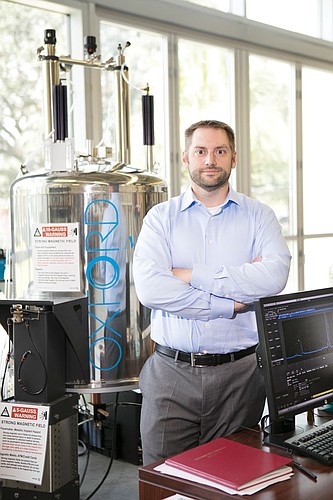- July 26, 2024
-
-
Loading

Loading

Intezyne, a Tampa-based biopharmaceutical company, wants to cure not just one, but seven types of cancer — and it hopes it's about to take a critical step toward that goal in 2018.
The company, founded in 2004 and headquartered at USF's Tampa Bay Technology Incubator, plans to begin clinical trials of two anti-cancer programs — known as IT-139 and IT-141 — and investors are taking note.
In October, for one, Intezyne announced it had closed a $10 million Series A Preferred financing round, with existing investor Gaston Capital Healthcare Fund leading the way. A month later, the 19th Annual Southeast BIO (SEBIO) Investor and Partnering Forum recognized that achievement with its “Deal of the Year: Initial Funding” award.
Intezyne CEO Kevin Sill says the $10 million will primarily be used for clinical trials of its products, which are not new pharmaceuticals, but are instead ways to improve the effectiveness and delivery of cancer-fighting drugs that are already on the market.
But because it can take many years and even billions of dollars to bring a new drug to market, Intezyne has already launched a $30 million Series B Preferred round of capital fundraising. Sill says that will propel the company through 2018 and 2019 and “then, essentially, put us on the path for an IPO” in late 2019 or early 2020.
“That's very exciting — it's an exciting time for the company,” he says. “One of the other things we have going on is partnership discussions with several companies.”
Intezyne, like many biopharmaceutical companies before it, has had to play the long game with its business strategy. More than a decade on from its founding, the company has yet to turn a profit, and it generates nary a cent of revenue, says Sill. “We are fully funded by investors,” he says. “Any potential revenue may be coming from potential licensing or partnership activities.”
Intezyne's two programs are intended to treat a wide range of cancers: gastric, pancreatic, lung, breast, colorectal and thyroid cancer, as well as melanoma. IT-139, which is the closer of the two to being ready for clinical trials, could be particularly useful for treating pancreatic cancer — one of the deadliest forms of the disease. Every year, some 54,000 people are diagnosed with pancreatic cancer, and of those, less than 20% survive past the first year, while less than 8% survive after five years.
IT-141, meanwhile, is being studied at the Mary Crowley Cancer Research Center in Dallas. It's designed to improve the performance and delivery of irinotecan, a cancer-fighting drug, which in turn could significantly reduce side effects in patients.
Gaston Capital believes Intezyne is on to something with IT-139 and IT-141. Its founder and managing partner, Mick McMahan, says Intezyne is the lead investment in its recently launched health care fund. “We remain excited about Intezyne's prospects as an emerging oncology company that could improve outcomes in some of the deadliest cancer indications,” he states in a press release.
Sill likewise exudes confidence. He says Intezyne will look to hire additional staff for its business office, particularly people with accounting skills, in the coming year. “We're very pleased with the trajectory right now,” says Sill. “There's still a lot of work to be done, but we're very excited about the path that we're on. We have a lot of momentum going into 2018.”